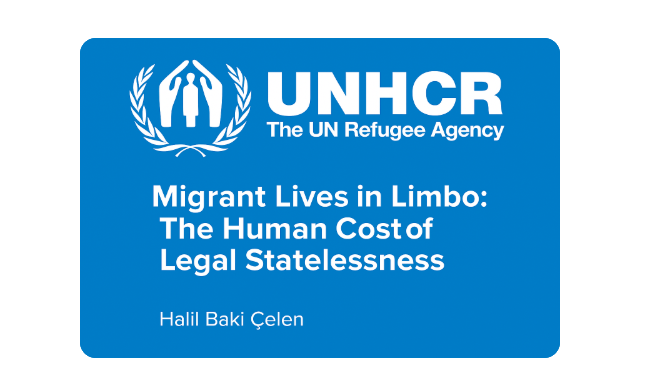Title: Challenging the Paradox of Protection: A Reflection on Statelessness, Bureaucratic Violence, and Exclusion in Modern Migration Regimes
Author: Halil Baki Çelen, Independent Legal Consultant, UNHCR
Abstract: This article provides a critical reflection on the contemporary migration management system, especially as it affects stateless individuals and asylum seekers who are trapped within bureaucratic and often contradictory legal structures. Drawing from personal legal experience and case observations within international institutions, the author exposes the growing distance between humanitarian protection principles and their practical implementation. This analysis discusses how statelessness, criminalization of mobility, and legal uncertainties reproduce systemic violence and exclusion, especially in border zones and administrative limbos. The study also challenges the utilitarian perception of migrants and proposes an ethics-centered perspective on human mobility and legal dignity.
Keywords: Statelessness, Migration Governance, Bureaucratic Violence, Human Rights, Exclusion, Legal Protection
1. Introduction In an era when mobility defines the socio-political tensions of globalization, the governance of migration has emerged not only as a matter of border control, but as a question of human dignity. The contradiction between international human rights law and domestic immigration policies creates liminal spaces where migrants—especially the stateless—are deprived of both voice and visibility. This article reflects upon this paradox, rooted in both professional legal observations and broader humanitarian principles.
2. The Stateless in a Stateless World Statelessness remains one of the most severe and invisible conditions in contemporary migration. The denial of citizenship leads to a cascade of rights deprivations, turning individuals into legal ghosts. In many of the cases I encountered, stateless persons are not merely undocumented—they are unacknowledged by the legal imagination of the state. Their “illegality” is not a result of crime, but of bureaucratic exclusion.
3. Bureaucratic Violence and Legal Ambiguity The violence experienced by migrants is often systemic and bureaucratic. It is found not in dramatic scenes, but in detention centers, registration backlogs, inadmissibility decisions, and asylum procedures designed more for deterrence than for justice. These are the tools of a silent war against mobility—a war waged through delay, ambiguity, and discretionary power.
4. The Utility Narrative: When Protection Meets Productivity There is a growing tendency in both political rhetoric and institutional discourse to frame migration in terms of labor utility. Refugees and migrants are often welcomed not for their vulnerability but for their economic potential. This instrumental approach erodes the foundations of humanitarian protection and reinforces hierarchies of worth.
5. Ethical Imperatives and Legal Reimagination It is time to reconsider the legal frameworks that govern migration, not only in terms of efficiency, but in terms of ethical responsibility. Law must be reimagined as a tool for inclusion and empathy. This includes recognizing the human right to mobility, ensuring access to due process, and confronting the racialized and classist roots of current migration regimes.
6. Conclusion The legal battles of migrants are not just administrative struggles—they are existential. Asylum systems must move beyond mere proceduralism toward substantive justice. This requires listening, legal innovation, and a rehumanization of governance. Statelessness and exclusion are not anomalies—they are the logical outcomes of a system designed to privilege sovereignty over solidarity.
References
Arendt, H. (1951). The Origins of Totalitarianism. Schocken Books.
Foucault, M. (1977). Discipline and Punish: The Birth of the Prison. Pantheon Books.
UNHCR. (2023). Global Trends: Forced Displacement in 2022. UNHCR.
Agamben, G. (1998). Homo Sacer: Sovereign Power and Bare Life. Stanford University Press.
Ticktin, M. (2011). Casualties of Care: Immigration and the Politics of Humanitarianism in France. University of California Press.
